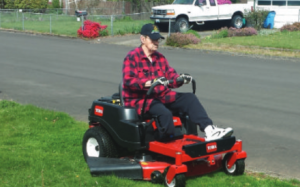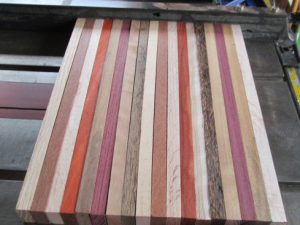Editor’s Note: Widower and Navy veteran Rober "Bob" Clausen did two tours in Vietnam. At the time, he thought he had returned home from the war relatively unscathed. Despite suffering from a back injury, he was still able to walk and lead a fairly normal life. But, like many Vietnam servicemen, Agent Orange came back to haunt him later in life, and at the age of 69, he became an amputee. A true soldier, Clausen refuses to let circumstances get in the way of doing the things he wants to do.
In 2011, my right calf started hurting while walking. It wasn't a cramp; the muscle just started hurting. I had major back surgery before that, but my back doctor said the pain wasn’t related. I was referred to a vascular doctor who did some tests and said I’d need one or two stents in the thigh and maybe a bypass in the lower leg. Since it was an invasive procedure, I went to the Department of Veteran Affairs for a second opinion. They came to the same conclusion.
In October 2012, I went in for surgery at the VA. They didn't end up putting two stents in my thigh or doing a bypass. Instead, they put a stent in my waist area right of the belly button. The blood pooled, and I ended up in intensive care for a day. It took a couple months for my body to recuperate all that blood, and it hurt. It was like getting kicked in the groin and the pain never goes away. After that, my leg didn't bother me for a few months, and then it started hurting again. The doctor said my right femoral artery was 90% plugged, so I had an angioplasty done to clean it out.
That December, I drove down to Reno from Vancouver, where I was living at the time, to be with my daughter for Christmas. The day I got there, I ended up in the ER because my artery was bleeding. They operated on my leg, and I stayed in a hospital there for nine days. The surgeon told me I was a lucky fellow because the majority of patients he’d had with that kind of aneurysm didn't survive. He also said I had a staph infection which was probably due to the prior surgery.
A few months later, I bought a house and three days before the move from my apartment, my right foot was hurting so badly I couldn't even put pressure on it. I went to the hospital, and they discovered I’d had another aneurysm. They decided it was necessary to amputate my right leg below the knee. From there, I went to a healthcare facility for a few weeks and ended up having a third aneurysm, so they had to take some more off that leg.
All of this happened because of the staph infection and inadequate blood supply from vascular disease. Vascular disease is the VA’s term for having served in Vietnam. Otherwise, it's called peripheral artery disease. They say that Agent Orange causes vascular disease, so here I am with one leg instead of two. I was 69 years old when amputated.
It took me a long time to heal. My leg was removed in 2014, but I couldn't get a prosthetic until August 2015. I used a manual wheelchair while healing because I couldn't get approved for an electric one. I’m not sure why. The nurses tell me I'm too independent, but when you live by yourself in a house, you have to be.
I would really like an Aqualeg. It allows you to wear the prosthetic all day long and also walk along the seashore. If it gets wet, no big deal because it's waterproof. If you want to go swimming, just jump in the pool. That's what it's made for.
The VA has a caregiver that comes out a couple times a week to do some housework. It's really helpful, but it bothers me because if I had the right prosthetic and wheelchair, I would be able to do almost everything I did before with two feet. I'm getting compensated well by the VA, but I have to pay people to do things that I used to do. That's what bothers me. I used to be active, but I just can't do it anymore.
It hurts your ego and your go-getter attitude because you can't do the things you used to be able to do.
 I'm mostly confined to a wheelchair inside and outside my house. I was able to get a grant from Home Depot because I'm a veteran and they made my house and property wheelchair compatible. They put a concrete ramp from the garage to the ground level and ran pavers out to my shop building. A manual wheelchair on grass or dirt surfaces is like trying to ride a bicycle in sand dunes. It just doesn't work.
I'm mostly confined to a wheelchair inside and outside my house. I was able to get a grant from Home Depot because I'm a veteran and they made my house and property wheelchair compatible. They put a concrete ramp from the garage to the ground level and ran pavers out to my shop building. A manual wheelchair on grass or dirt surfaces is like trying to ride a bicycle in sand dunes. It just doesn't work.
However, I found my wheelchair to be dangerous, so I made some alterations. The big wheels hold your weight, but if your weight is behind the axle, it's easy to tip backward, so they put those anti-tippers on them. I took those off because every time I tried to back up, the wheels would get hung up. I also moved the axle housings back so my weight is no longer behind the big wheels and lowered the front wheels, so I can propel faster.
I used to drive truck. You always have to load a truck in such a way that it meets all the laws, but also so that it won't break down your trailer. It's called weight distribution. I used those principles to make alterations to my wheelchair.
I was told I couldn’t drive with a prosthetic leg and that I’d have to learn with levers and buttons.
But if you want something bad enough, you're going to do it.
So now I'm driving. I have a motorcycle, too. I will ride it someday. I can't garden anymore because it's not possible with the wheelchair. I enjoy cooking. I have to since I live alone. I also enjoy woodwork. I made each of my daughters a game board with a black onyx chess set, checkers, and deluxe scrabble. They are on a lazy susan. It took a while to figure out how to do that. I made some tissue and toilet paper holders out of red oak. I have done some pool cue racks, a coat rack, and some anniversary clocks. I started a cutting board with exotic hardwoods from different countries. Now I just have to find the time to finish it!

After my first amputation, I was in the hospital feeling sorry for myself thinking, “geez, who was I this mean to to deserve this kind of punishment?” But when they cut the leg the second time, I happened to think, “you know, stuff happens.” You just have to start thinking a little bit differently and praying. Praying is very important. I don’t go to church, but I'm religious in my own way. When I'm having trouble with pain, I'm already laying on my back, so I just fold my hands and rattle away. I'm allergic to opiates, so I can't take any kind of pain medication. It's hard. You can work yourself up to it and tell yourself you can handle it, but when it actually happens, you may not be able to handle it. I found that mind over matter works.
Anytime you can get your mind off of your injury, you're better off.
Editor’s Note: All information contained in this article was provided by Robert Clausen. The views expressed do not necessarily reflect the views of Wheel:Life.
 Amplitude magazine provides valuable and unbiased news, information, and resources for amputees who want to live more fully, as well as articles and information relevant to their families and their caregivers. It offers content on a wide variety of topics, including peer support, active living, emotional issues, health and wellness, mobility, and adaptive living—anything that will help amputees enjoy all that life has to offer. Learn more at www.amplitude-media.com.
Amplitude magazine provides valuable and unbiased news, information, and resources for amputees who want to live more fully, as well as articles and information relevant to their families and their caregivers. It offers content on a wide variety of topics, including peer support, active living, emotional issues, health and wellness, mobility, and adaptive living—anything that will help amputees enjoy all that life has to offer. Learn more at www.amplitude-media.com.